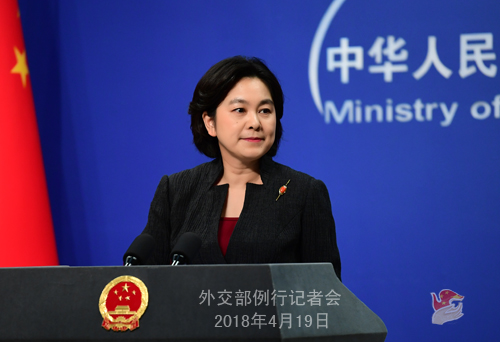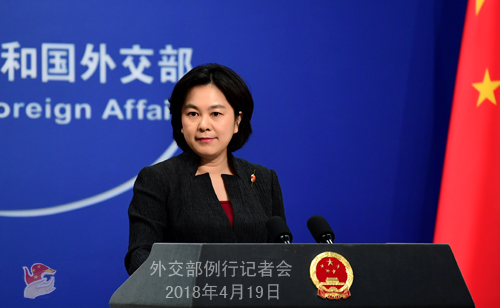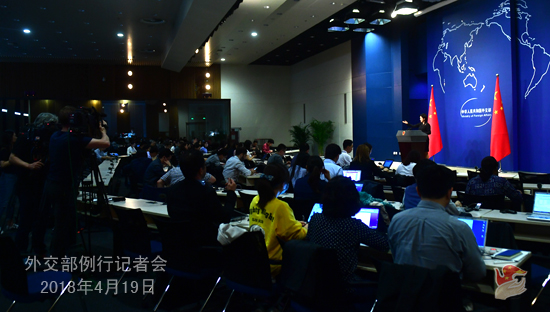| Foreign Ministry Spokesperson Hua Chunying's Regular Press Conference on April 19, 2018 |
| 2018-04-19 23:11 |
|
Q: According to reports, the ROK Ministry of Unification spokesperson yesterday said that the ROK will consult with the DPRK to release a declaration to end the state of war and establish a permanent peace regime on the Korean Peninsula. What is your comment? A: We believe that denuclearizing the Korean Peninsula and establishing a peace regime in parallel in accordance with the "dual-track" approach is an effective way to fundamentally resolve the Korean Peninsula issue. China supports an early end to the state of war and the establishment of a peace regime on the Peninsula with the concerted efforts of all relevant parties. As a party concerned to the Peninsula issue, China is willing to play a positive role to this end. Q: Handelsblatt reported that ambassadors of many EU countries supported a report criticizing the Belt and Road Initiative, which alleged that China has blocked free trade and put Chinese enterprises at advantage through this initiative. What is your comment? A: We have noted this report. According to my information, the EU side has clarified with China that the report by Handelsblatt is inconsistent with facts. You may still remember that the leaders of most EU countries have in public expressed their interest in joining the Belt and Road Initiative. For example, Prime Minister of the Netherlands Mark Rutte said his country was highly interested in the Belt and Road Initiative while attending the Boao Forum for Asia Annual Conference 2018 not long ago. French President Emmanuel Macron called on the whole Europe to actively engage in the initiative during his visit to China. British Prime Minister Theresa May said that the Belt and Road Initiative has far-reaching influence over the globe and she hopes that the UK and China will carry out cooperation under the initiative to promote global and regional economic growth. China has stressed many times that the Belt and Road Initiative is a global public good for mutual benefit, win-win outcomes and common development. The Belt and Road Initiative follows the principle of extensive consultation, joint contribution and shared benefits as well as the market law and established international rules, with a view to achieving high-quality sustainable development. As I said yesterday, the Belt and Road Initiative is a transparent one. Whether in cooperation planning or projects implementation, everything is decided through consultation and operated in an open and transparent manner. The accusation mentioned by you that China is capitalizing on the Belt and Road Initiative to block free trade is obviously inconsistent with facts. Promoting unimpeded trade and enhancing trade liberalization and facilitation constitute an important part of the Belt and Road Initiative. There are indeed many trade barriers in the world, but who can tell me which is attributed to China's Belt and Road Initiative? On the contrary, those more than 80 countries that have inked cooperation agreements with China under the Belt and Road Initiative all support promoting unimpeded trade through the initiative. We hope that relevant parties can look at and interpret the Belt and Road Initiative in an objective and correct manner. Q: According to reports, the Chinese Ambassador to Australia, when recently giving an interview to the local media, once again denied China's political infiltration in Australia. He also said that the buildup of mistrust between China and Australia would affect bilateral trade and economic relations. Australian Prime Minister Malcolm Turnbull, who is on a visit in London now, responded that the bilateral trade and economic relations are stable and enjoy strong development, but he also said that Australia would not retreat when it comes to preventing foreign political infiltration. What is your comment? A: I will answer your question from the following two perspectives. First, with regard to political infiltration, we have responded to it on multiple occasions. There are normal people-to-people exchanges between countries and normal exchanges and cooperation can be conducted in various fields. If one views normal exchanges as infiltration, he had better lock himself in a dark room and live in isolation. People with such a mindset should reflect on themselves. Second, regarding China-Australia relations, the normal and friendly exchanges and cooperation between countries should be underpinned by reliable and strong mutual trust. Without mutual trust, exchanges and cooperation in other areas would be impossible. We hope that the Australian side can make concrete efforts to discard its prejudices and discriminatory practices against China, join hands with China to step up mutual trust and create enabling conditions and relaxing atmosphere for our exchanges and cooperation across the board. Q: The China International Development Cooperation Agency was officially unveiled yesterday. What is the significance of this agency to China's diplomacy in a new era? A: The unveiling ceremony for the China International Development Cooperation Agency was held yesterday. Member of the Political Bureau and Director of the Office of the Foreign Affairs Commission of the CPC Central Committee Yang Jiechi and State Councilor and Foreign Minister Wang Yi attended the ceremony. Setting up this agency is an important decision made by the CPC Central Committee with comrade Xi Jinping at its core for the development of the Party and the country. It is a major initiative to uphold world peace and promote common development, which has a far-reaching significance for the general layout of China's diplomacy and the international cooperation on the Belt and Road Initiative. During the past 60-plus years, we have been carrying forward the spirit of internationalism and following the basic principles of equality, mutual respect, results orientation and mutual benefit to offer assistance to other developing countries with no political strings attached as our capacity allows. We have created a foreign assistance model with Chinese characteristics, which has won high acclaim from the international community, especially the developing countries. Presently, the international landscape is undergoing big changes and the human society is at a crossroads. The socialism with Chinese characteristics has entered a new era. Just as General Secretary Xi Jinping highlighted, we will uphold justice and pursue shared interests and adhere to the principles of sincerity, real results, affinity and good faith to enhance solidarity and cooperation with other developing countries. We will increase assistance to other developing countries, the least developed countries in particular, bridge the north-south gap and forge a community with a shared future for mankind so as to make greater contributions to the common prosperity and progress of the human society.
Q: The US Federal Reserve's latest "Beige Book" on the state of US business across the central bank's 12 regional districts published on April 18 said that steel and aluminum prices rose nationwide as a result of recently-imposed tariffs on imported steel and aluminum by the US government. The US manufacturing, agriculture and transportation industries and enterprises have raised their concern over the US administration's move and possible imposition of tariffs on a wider list of Chinese imports going forward. Yesterday, joined by Japanese Prime Minister Shinzo Abe, US President Donald Trump told the press that the US tariff rate for Chinese cars is 2.5 percent while the Chinese duty on US cars is 25 percent. "Reciprocal" will be the primary word that they're going to be using in the US trade with China. What is China's comment? A: We have noted the relevant reports. I also noticed that the Brookings Institution said in a recent report that the China-US trade war could jeopardize up to 2.1 million jobs in 2,700 American counties. In addition, 107 US business and industry groups already sent a letter to the House Ways and Means Committee to oppose the imposition of tariffs on Chinese goods. The Federal Reserve's report you mentioned once again shows that in today's world featuring highly interdependent global economy, seeking unilateralism and trade protectionism is self-defeating as well as harmful to others. With regard to the issue of tariffs on imported automobiles, I only want to remind you of several facts. First, though the US tariffs on imported passenger vehicles are only 2.5%, the rate for imported trucks is as high as 25%. Second, China's 25% tariffs are for imported whole vehicles and the rate for components and parts are only 10%. Third, most of the US automobiles sold in China are manufactured by the Chinese branches of those US car-makers. General Motors alone sold as many as around 4 million vehicles in China in 2017, and the Cadillac sold more cars in China than in the US. It is fair to say that the US car-makers have reaped enormous dividends in China. On the other hand, the US exported over 280,000 vehicles to China in 2017, while the Chinese ones exported to the US only amounted to 53 thousand over the same period. Therefore, a simplistic comparison of the Chinese and US tariff rate for imported finished automobiles makes no sense. Finally, let's talk about the word "reciprocal". I would like to point out that when it comes to tariffs, the WTO doesn't have a principle of reciprocal tariffs and the overall rate varies a lot among the WTO members. The standards of reciprocity and fairness cannot be determined by oneself alone entirely on the basis of its own interests and needs. Instead, unified international rules and standards should be set up through equal negotiations by all and they should be followed by all. Imposing business deals on others is by no means reciprocal or fair, and someone who is self-righteous and presumptuous in this aspect will suffer the consequence of his action. Q: The National Development and Reform Commission has announced new opening-up measures regarding automobile and other industries. Can we view this as a response to the United States? A: The National Development and Reform Commission recently has responded to the questions raised by journalists in this regard in details. We have stressed multiple times before that China will press ahead with the reform and opening-up in accordance with the set goals and tempo. At the Boao Forum for Asia Annual Conference 2018, President Xi Jinping announced a series of major measures China will take to expand opening-up, which are the solemn commitments made by the Chinese people to people around the world. The experience of China's endeavor to pursue reform and opening-up in the past four decades demonstrates that on the basis of a certain degree of development, only opening-up can fully stimulate market vitality, compel enterprises to pursue innovation and amass resources from both home and abroad. The full opening-up of our manufacturing industry demonstrates that we are crystal clear in our stance against trade and investment protectionism and that we unequivocally support the extensive and in-depth development of economic globalization and both Chinese and foreign enterprises in achieving common development on a level playing field. We believe that the new round of China's opening-up will deepen reform, promote the high-quality development, competition among industries and the optimal allocation of resources, further energize the market and break new ground in opening up in all-round way. We welcome other counties' sharing of the opportunities brought by China's opening up and development. It goes without saying that whoever pursues protectionism and closes its own door to China will end up in locking the door that leads to China. Q: According to reports, in a recent subcommittee hearing of the House Committee on Science, Space and Technology, some accused Chinese experts, scholars and students of "stealing" US scientific and technological outcomes and described China's talents program as a threat to the US, asking the US government to tighten up and restrict scientific and technological communication and cooperation with China. What is your comment? A: Certain US people's highly irresponsible remarks are sheer fabrication and constitute a deliberate slander against Chinese experts, scholars and students. The people-to-people and cultural exchanges between China and the US meet the aspirations of the two peoples and are beneficial to both sides. Q: According to reports, in response to China's growing influence in the Pacific region, the Australian leaders will use the upcoming Commonwealth Heads of Government Meeting to urge the members of the Commonwealth to step up their presence in that region. Previously, the Australian officials once criticized China of building a military base in Vanuatu, which has been refuted by Vanuatu. We noted that a Vanuatu media director's article recently published in Fiji's largest newspaper says that this week Vanuatu began to evacuate hundreds of thousands of residents from the island of Ambae as a volcano there erupted, using the Chinese-aided wharfs that were called the future Chinese naval base by Australia. The article calls on Australia to heed the voice of the island countries and stop indulging in its "malicious speculation". What is your comment? A: I have seen that report. Indeed, the relevant country should put aside its arrogance and learn to listen to the voice of other countries and people with an open mind. Slander or containment won't win respect from others. Action speaks louder than words when it comes to lending help to the island countries.
|
 |
|


